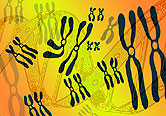
MONDAY, Oct. 28 (HealthDay News) — Researchers report they have pinpointed 11 new genes linked to late-onset Alzheimer’s disease, doubling the number of potential targets for drug development.
The international team of scientists analyzed genetic data from more than 25,500 Alzheimer’s patients and more than 49,000 people without the memory-robbing disease in 15 countries.
Along with adding 11 new genes to those already known to be associated with Alzheimer’s, the researchers identified 13 other genes that require further investigation, according to the study published Oct. 27 in the journal Nature Genetics.
The findings provide a wider view of the genetic factors that contribute to Alzheimer’s and increases the understanding of the disease to new areas. This includes the immune system, where a genetic overlap with other neurodegenerative diseases, including multiple sclerosis and Parkinson’s, was identified.
“The discovery of [new] pathways is very encouraging, considering the limited success of Alzheimer’s disease drugs tested so far,” Margaret Pericak-Vance, director of the Institute for Human Genomics at the University of Miami Miller School of Medicine, said in a school news release.
“Our findings bring us closer toward identifying new drug targets for Alzheimer’s and other neurodegenerative diseases. We’ll continue to expand and analyze our data set with this incredible group so that we can better understand the genetic influences on this devastating disease, and find new medical and therapeutic interventions,” said Pericak-Vance, co-leader of the analysis teams for the American Alzheimer’s Disease Genetics Consortium that worked on the study.
Several of the 11 genes identified in the study confirm known biological pathways of Alzheimer’s disease. One of the more significant new genes was found in a part of the genome that plays a role in the immune system and inflammatory response. This suggests that diseases where abnormal proteins accumulate in the brain — Alzheimer’s, Parkinson’s and multiple sclerosis — may have a common mechanism and possibly a common drug target.
More information
The U.S. National Institute of Neurological Disorders and Stroke has more about Alzheimer’s disease.
Copyright © 2026 HealthDay. All rights reserved.

